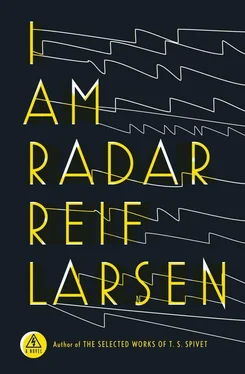Horeb was impressed. “I cannot drum with my mind,” he said.
“Not yet,” said Radar.
• • •
201-998-2666:Ana Cristina, I’ve become the radio and the radio is me! When I get back I have things to tell u. How are you? I think of u everyday. Of your lips and the sound of your voice. I’m trying to remember everything — ><-
The birds, for their part, had also gone through a kind of evolution. The first few days, they had flown only when called upon and then they would dutifully return to the wagon and fall quiet. But gradually they had developed a mind of their own. They now roosted all over the boat, in the container, on the roof of the pousser . They always traveled in pairs. At all hours of the day and night, you could invariably spot a few pairs flittering about here and there, even in the pouring rain. Otik, who had begun acting more and more erratic with each passing day, did not seem to notice or care about the unraveling of his flock.
“They are entangled,” is all he would say.
“I still don’t know what this means,” said Radar.
“I believe also two people can become quantumly entangled,” said Otik.
“Two people ?”
“Yes, two people. These two people are two people, but also same person. Everything that you do affects other person, even if you never meet him.”
“Okay,” said Radar. “So have you ever been entangled with someone?”
“Not anymore,” said Otik. “Once, but not anymore. It is un tangle that hurts.”
Though they resembled live birds in beak, wing, and feather, the puppet birds continued to project a muddled signal of sentience. They would sit huddled and quivering, staring at Radar with empty eyes as he entered Moby-Dikt and lay down on his cot. Several pairs of birds had even taken to nesting in bed with him. He would reach out in the darkness and touch their bodies, feeling the quiet churn of their gears. They were warm to the touch, but not with the warmth of life. Radar tried to figure out what was required for something to be considered alive. Was it sufficient to just appear alive? If no one else could tell the difference, wasn’t that enough?
Order had not completely disappeared, however: when Otik fired up the vircator, the birds would still respond to their creator, leaving their perches to converge upon the wagon, forming a great mass that, as soon as the drums began, swarmed into the air as if on command.
“It is command — of course it is command. They are electrical, I command them,” said Otik when pressed, though the precise degree of control he exerted over them was becoming less and less clear. Increasingly, pairs of birds could be seen breaking away from the pack in the middle of a rehearsal and flying off across the river and into the jungle. The flock was still large, but there were noticeable gaps now. Radar wondered what a man might think wandering through the jungle and coming across the carcass of a bird puppet.
“Why do they fly away?” asked Radar.
“This is malfunction — of course there is malfunction,” said Otik. “Everyone malfunction — you malfunction, I malfunction. Remember, what we are doing is very complex and even crazy. More crazy than rocket science, more crazy than human clones.”
• • •
201-998-2666:Hello Mom. The smells! I wish you could smell these smells! R
On the fourth night, they had again moored near the bank, though this time no village was in sight. A couple of pirogues approached from downstream, the men offering a meager assortment of fish that Horeb examined and declared inedible. The men in the pirogues presented no books, which by now was highly unusual. Blasphemous, even. Indeed, the country in these parts felt swollen with a sinister brand of quiet. Like a recently abandoned crime scene. Except that there was no body, no crime.
Another coal fire was lit on the deck of the barge to discourage the mosquitoes, and chairs were pulled round. Lacking any other food, Horeb went about making fufu paste in a pot. Radar sat near one of his radios, writing in his journal. Lars and Otik sat together, quietly arguing about some obscure dramaturgical point, a conversation that had no doubt been going on for years. The man with the sounding pole huddled just on the edge of the firelight, smiling at something small and precise and entirely his own.
They had all settled into a strange routine, the kind of routine men fall into when they are trapped in the pursuit of the divine. Nearby, their goat, whom they had named Bertolt Brecht, bleated softly, homesick. And still: a hundred or so birds shivered and watched them from all around the barge. Not quite watching. Waiting. For whatever would come.
Radar found himself looking up at the vast compartment of stars above. He thought of Ivan then; wondered whether he was back across the sea already. Whether he would ever see his child again. He tried to find Alpha Centauri, with its A and B and its little Proxima, but one star blurred into the next, and when he found what he thought must be it, he was immediately consumed with doubt. What he lacked was Ivan’s certitude. To be certain was almost better than being right.
Suddenly, Professor Funes appeared in the firelight. The sight of him caught all of them off guard. Lars and Otik stopped talking. Horeb looked up from his cooking. Radar lifted up his pen in the middle of the sentence. Funes stood there in hat and dark glasses, his blanched skin glowing in the light of the flames.
And then, before anyone could say anything, he spoke:
“Come you lost atoms to your Centre draw,
And be the Eternal Mirror that you saw:
Rays that have wander’d into Darkness wide,
Return, and back into your Sun subside.”
A rustling from the birds. Bertolt Brecht bleated quietly in the shadows.
“The last lines of Attar’s poem,” said Funes. “FitzGerald’s translation, 1887. I’ve wanted to tell you this for some time.”
They stared at him. No one spoke until Radar got up from his seat.
“Would you like to join us?” he said.
Funes shook his head. “I can’t.”
More silence. Radar pressed his luck. “We haven’t really seen you around much,” he said.
“You must understand that everything is quite painful for me.”
Radar peered at the professor’s skin. It was stretched too tight in places, and had grown lumpy in others. The skin did not match the man.
“Are you ill?” he asked. He was immediately ashamed of his impertinence, but Funes did not look offended by the question.
“In a manner of speaking,” he said. “Though in all of human history, my condition has been documented only once before.”
“What’s your condition?” said Radar. His forwardness was quite out of character, but then, he also boasted a condition documented only once before.
After a moment’s hesitation, Funes sank into Radar’s vacated chair.
“I’ve taken this river hundreds of times,” he said. “It is never the same river twice.”
“It’s my first river,” said Radar. “Well, if you don’t count the Passaic, back in New Jersey.”
“It counts. If it’s watery and it flows, it’s a river,” said Lars.
“Barely water. Mostly toxic waste,” said Otik.
“It’s getting cleaner,” said Lars.
“Clean, my asshole,” said Otik.
“No, thank you,” said Lars.
Radar could see that Funes was growing uncomfortable.
“You’ve lived here a long time?” he said, trying to include him in the conversation.
Funes said nothing at first. They all watched the bent frame of their host. His eyes were transfixed by the fire’s glowing coals. Radar was just about to fill the space left behind by his silence, but then Funes began:
Читать дальше












